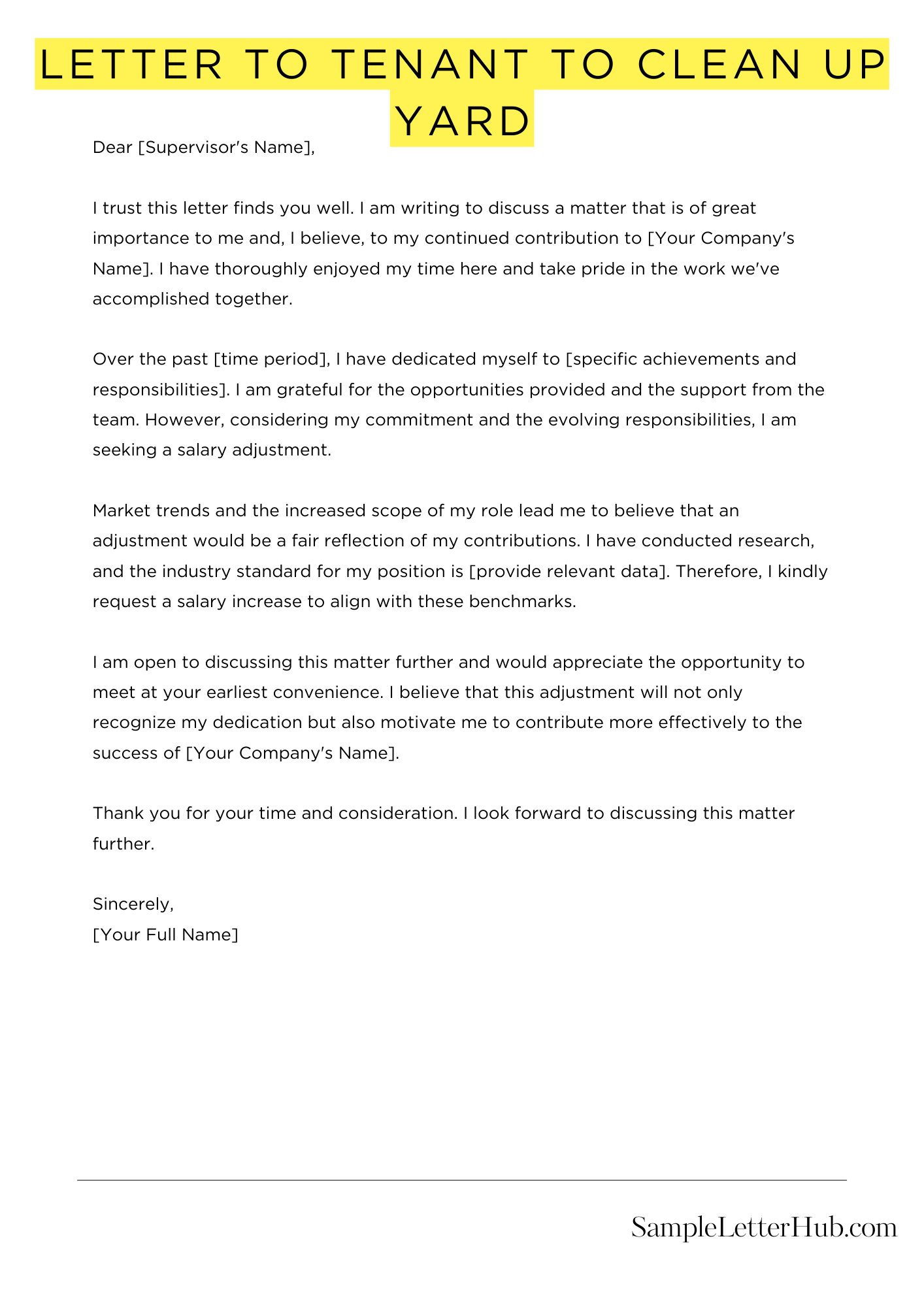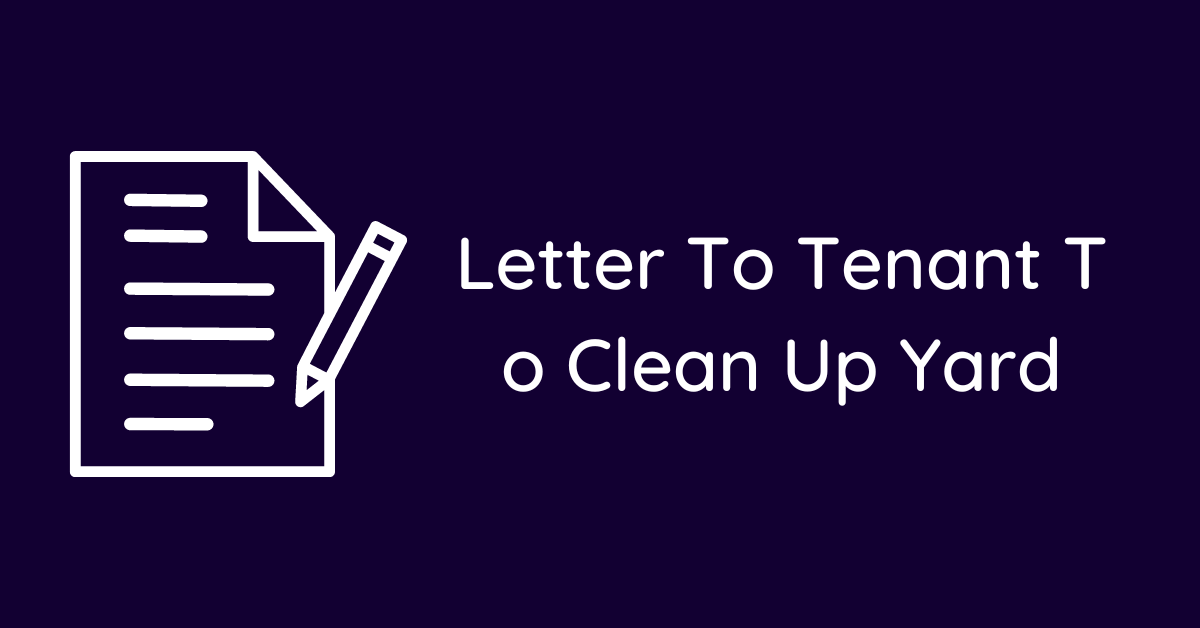A Letter To Tenant To Clean Up Yard is a formal notice sent by a landlord to a tenant requesting them to clean up and maintain the yard area of the rental property. It outlines the specific areas that need attention and provides a deadline for completion.
In this blog article, we will provide you with several templates, examples, and samples of Letter To Tenant To Clean Up Yard. These samples are designed to make it easy for you to draft a clear and effective letter to your tenant, ensuring that the yard is maintained in a clean and presentable condition.
Notice to Tenant Regarding Yard Maintenance
Dear [Tenant’s Name],
I hope this letter finds you well. I am writing to inform you that the yard outside your rental property requires immediate attention.
As per the terms of our lease agreement, tenants are responsible for maintaining the yard in a clean and orderly condition. This includes mowing the lawn, trimming hedges, and removing debris.
Currently, the yard is overgrown with weeds, and there is trash and other items scattered throughout. This not only detracts from the appearance of the property but also poses a potential hazard to health and safety.
I kindly request that you take immediate action to clean up the yard. Please complete the necessary tasks by [insert date].
If you are unable to complete the yard maintenance yourself, please contact me as soon as possible to arrange for professional assistance. The cost of any professional services will be deducted from your security deposit.
Your cooperation in this matter is greatly appreciated. If you have any questions or concerns, please do not hesitate to contact me.
Thank you for your attention to this matter.
Sincerely,
[Your Name]

How to Write a Letter to a Tenant to Clean Up the Yard
It is important to maintain a clean and tidy yard for both the tenant and the landlord. A well-maintained yard can help to prevent pests, improve the curb appeal of the property, and create a more enjoyable outdoor space for everyone. If you are a landlord and your tenant is not keeping the yard clean, you can write a letter to them requesting that they clean it up.
Here are some tips on how to write a letter to a tenant to clean up the yard:
- Be polite and respectful. Even though you are the landlord, it is important to be polite and respectful when communicating with your tenant. This will help to create a positive relationship and make it more likely that they will comply with your request.
- Be clear and specific. In your letter, be clear and specific about what you want the tenant to do. For example, you could say, “Please mow the lawn, trim the bushes, and remove any weeds from the yard.”
- Set a deadline. Give the tenant a deadline for when you want the yard to be cleaned up. This will help to create a sense of urgency and make it more likely that the tenant will take action.
- Be willing to compromise. If the tenant is not able to clean up the yard by the deadline you set, be willing to compromise. For example, you could agree to help them with the cleanup or give them a longer deadline.
- Follow up. Once you have sent the letter, follow up with the tenant to make sure that they have received it and that they are taking steps to clean up the yard.
By following these tips, you can write a letter to your tenant that is polite, respectful, and effective. This will help to increase the chances that the tenant will clean up the yard and that you will have a positive relationship with them.
FAQs about Letter To Tenant To Clean Up Yard
Q1: What should I include in a letter to my tenant about cleaning up their yard?
A: When writing a letter to your tenant about cleaning up their yard, be sure to include the following information:
– A clear and concise statement of the problem, including any specific areas that need attention.
– A deadline for when the cleanup must be completed.
– The consequences of not cleaning up the yard, such as fines or eviction.
– A polite and professional tone, even if you are frustrated with the situation.
Q2: How can I write a letter to my tenant about cleaning up their yard without being confrontational?
A: When writing a letter to your tenant about cleaning up their yard, it is important to be polite and professional, even if you are frustrated with the situation. Here are some tips for writing a non-confrontational letter:
– Start by thanking the tenant for their tenancy and expressing your appreciation for their cooperation.
– Clearly state the problem, but avoid using accusatory language.
– Focus on the positive outcomes of cleaning up the yard, such as a more attractive property and a healthier environment for everyone.
– Be clear about your expectations and the deadline for cleanup, but avoid using threats or ultimatums.
Q3: What should I do if my tenant does not clean up their yard after I have sent them a letter?
A: If your tenant does not clean up their yard after you have sent them a letter, you may need to take further action. Here are some steps you can take:
– Send a follow-up letter, reiterating your expectations and the deadline for cleanup.
– Contact your local housing authority or code enforcement office to file a complaint.
– Hire a professional cleaner to clean up the yard and deduct the cost from the tenant’s rent.
Q4: Can I evict my tenant for not cleaning up their yard?
A: In most cases, you cannot evict your tenant for not cleaning up their yard. However, if the yard is in a state of disrepair that poses a health or safety hazard, you may be able to evict the tenant for violating their lease agreement.
Q5: What are some tips for preventing yard cleanup issues with tenants?
A: Here are some tips for preventing yard cleanup issues with tenants:
– Include clear language in the lease agreement about the tenant’s responsibility to maintain the yard.
– Regularly inspect the property to identify any potential problems.
– Communicate with tenants about your expectations for yard maintenance.
– Be willing to work with tenants to resolve any issues that may arise.

